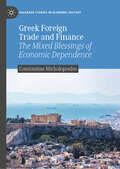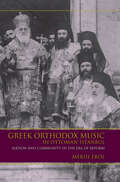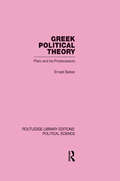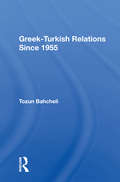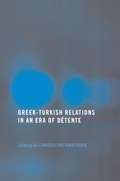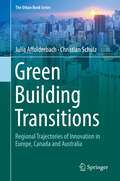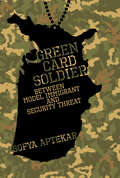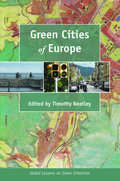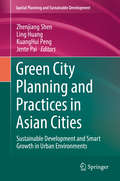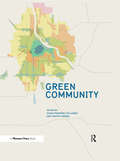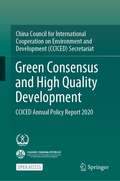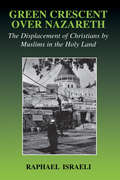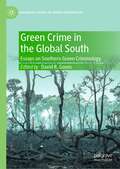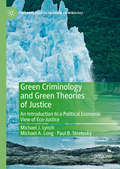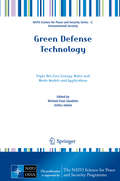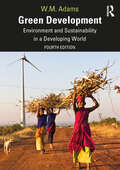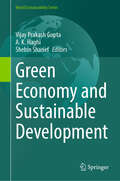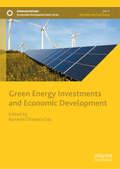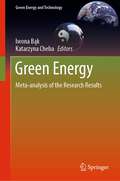- Table View
- List View
Greek Foreign Trade and Finance: The Mixed Blessings of Economic Dependence (Palgrave Studies in Economic History)
by Constantine MichalopoulosThis book examines the role of international trade and finance in the Greek economy since the beginnings of the Greek state two centuries ago to the present day. It focuses on the benefits and challenges of Greece&’s economic dependence on the larger and higher income countries of Western Europe, and in particular the European Union, have played in its economic development. The volume begins by examining Greece&’s links to Europe in the 19th century and its desultory participation in the Latin Monetary Union. Its main focus is the post- World War II period, starting with Greece&’s efforts to establish sustainable economic growth, at a time when the country was facing severe foreign exchange constraints and relied on assistance from the US under the Marshall Plan. It then examines relations between Greece and the European Community, particularly on its efforts to integrate into the European Union, the debt crisis and the reforms and recovery in its aftermath. The book details in accessible and engaging style how the story of Greece&’s economic integration in Europe has involved both successful development but also failures by Greek, Eurozone and IMF policymakers. With valuable historical insights, this book will be of interest to academics and policymakers in Greece, the EU and emerging economies weighing economic integration. It will also be of interest to economic historians and political economists more broadly.
Greek Orthodox Music in Ottoman Istanbul: Nation and Community in the Era of Reform (Ethnomusicology Multimedia)
by Merih ErolA study of the musical discourse among Ottoman Greek Orthodox Christians during a complicated time for them in the nineteenth and early twentieth centuries.During the late Ottoman period (1856–1922), a time of contestation about imperial policy toward minority groups, music helped the Ottoman Greeks in Istanbul define themselves as a distinct cultural group. A part of the largest non-Muslim minority within a multi-ethnic and multi-religious empire, the Greek Orthodox educated elite engaged in heated discussions about their cultural identity, Byzantine heritage, and prospects for the future, at the heart of which were debates about the place of traditional liturgical music in a community that was confronting modernity and westernization. Merih Erol draws on archival evidence from ecclesiastical and lay sources dealing with understandings of Byzantine music and history, forms of religious chanting, the life stories of individual cantors, and other popular and scholarly sources of the period. Audio examples keyed to the text are available online.“Merih Erol’s careful examination of the prominent church cantors of this period, their opinions on Byzantine, Ottoman and European musics as well as their relationship with both the Patriarchate and wealthy Greeks of Istanbul presents a detailed picture of a community trying to define their national identity during a transition. . . . Her study is unique and detailed, and her call to pluralism is timely.” —Mehmet Ali Sanlikol, author of The Musician Mehters“Overall, the book impresses me as a sophisticated work that avoids the standard nationalist views on the history of the Ottoman Greeks.” —Risto Pekka Pennanen, University of Tampere, Finland“This book is a great contribution to the fields of historical ethnomusicology, religious studies, ethnic studies, and Ottoman and Greek studies. It offers timely research during a critical period for ethnic minorities in the Middle East in general and Christians in particular as they undergo persecution and forced migration.” —Journal of the American Academy of Religion
Greek Political Theory (Routledge Library Editions: Political Science #18)
by Sir Ernest BarkerMuch has been written about the interpretation of Plato in the last thirty years. Once interpreted as a revolutionary of the left, and a prophet of Socialism, he has lately been interpreted as a revolutionary of the Right and a forerunner of Fascism. In this book Plato appears as himself – a revolutionary indeed, and even an authoritarian, but a revolutionary of the pure idea of the Good, and an authoritarian of the pure reason, unattached either to the Right or the Left.
Greek-Turkish Relations Since 1955
by Tozun BahcheliBahcheli analyzes the dispute over Cyprus from its emergence in the 1950s to the coup against President Makarios which brought Greece and Turkey to war in 1974. He considers the Cyprus issue within the narrow context of Greek-Turkish relations, and the broad context of international relations
Greek-Turkish Relations in an Era of Détente
by Barry Rubin Ali ÇarkoğluGreek-Turkish conflict-ridden relations have long occupied a problematic position in the Western alliance, first in NATO then, more dramatically, within the context of the newly developing European Union and its defence initiatives. Following three major earthquakes on both sides of the Aegean, the two countries have now experienced, firstly, a public empathy towards each other, and secondly, a significant diplomatic rapprochement. This rapprochement though has failed to resolve the Cyprus conflict, and is now at risk of reverting back to a series of conflicts. This book addresses the crucial issues between Greece and Turkey, from a critical perspective, and provides an up-to-date assessment of the current state of the Greek-Turkish rapprochement and its future development. This book was previously published as a special issue of the journal Turkish Studies.
Greeks and Barbarians
by Kostas VlassopoulosThis book is an ambitious synthesis of the social, economic, political and cultural interactions between Greeks and non-Greeks in the Mediterranean world during the Archaic, Classical and Hellenistic periods. Instead of traditional and static distinctions between Greeks and Others, Professor Vlassopoulos explores the diversity of interactions between Greeks and non-Greeks in four parallel but interconnected worlds: the world of networks, the world of apoikiai ('colonies'), the Panhellenic world and the world of empires. These diverse interactions set into motion processes of globalisation; but the emergence of a shared material and cultural koine across the Mediterranean was accompanied by the diverse ways in which Greek and non-Greek cultures adopted and adapted elements of this global koine. The book explores the paradoxical role of Greek culture in the processes of ancient globalisation, as well as the peculiar way in which Greek culture was shaped by its interaction with non-Greek cultures.
Green Alternatives and National Energy Strategy: The Facts behind the Headlines
by Philip G. GallmanIt is no secret that the United States’ dependence on oil—mostly foreign—puts the country in a precarious position. The United States needs innovative ways not only to power millions of automobiles on its highways but also to secure sustainable sources of fuel for the future. This book presents the latest facts and figures about alternative energy to any physicist, engineer, policymaker, or concerned citizen who needs a reliable source of information on the nation’s looming energy crisis. Philip G. Gallman focuses especially on green vehicles and the interrelationship between their design and various energy sources. He explains simply and clearly the complex energy and automotive engineering issues involved in developing green vehicles, measures their likely effect on energy resource demand, and considers what they might mean for national energy strategy. Addressing problems associated with renewable resources often overlooked or ignored in the popular press, Gallman explains what replacing oil with alternative sources of energy realistically entails. Can the nation satisfy its energy demands with wind turbines, solar power, hydroelectric power, or geothermal power? Is biodiesel or electricity the answer to our gas-guzzling ways? Organized logically and with an accessible narrative, Green Alternatives and National Energy Strategy guides readers through the essential questions and hurdles the United States must answer and overcome to transition from a petroleum-dependent nation to one that runs on sustainable, renewable energy.
Green Building Transitions: Regional Trajectories Of Innovation In Europe, Canada And Australia (The Urban Book Series)
by Julia Affolderbach Christian SchulzThis volume analyzes sustainability-related innovations in the building sector and discusses how regional contexts articulate transition trajectories toward green building. It presents ‘biographies’ of drivers and processes of green building innovation in four case studies: Brisbane (AUS), Freiburg (GER), Luxembourg (LU), and Vancouver (CA). Two of them are relatively well known for their initiatives to mitigate climate change – particularly in the building sector, whereas the other two have only recently become more active in promoting green building. The volume places emphasis on development paths, learning processes, and innovations. The focus of the case studies is not restricted to purely technological aspects but also integrates regulatory, procedural, institutional, and other processes and routines and their influence on the variations of the building sector. The diversity of the selected case studies offer the reader the opportunity to gain a thorough understanding of how sustainability developments have unfolded in different city regions. Case study-specific catalogues of transition paths provide insights to inform policy debates and planning processes. The catalogues identify crucial innovations (technological, regulatory, etc.) and explain the factors and circumstances that have led to their success and broader acceptance in Freiburg, Vancouver, Luxembourg, and Brisbane. With the help of a number of micro case studies within each of the four city regions, the case studies also offer ground for comparison and identification of differences. The book represents the outcome of the GreenRegio project, which stands for ‘Green building in regional strategies for sustainability: multi-actor governance and innovative building technologies in Europe, Australia, and Canada.’ GreenRegio is a 3-year CORE-INTER research project funded by the National Research Fund Luxembourg (lead) and the University of Cologne, and this volume is co-authored by the project’s principal investigators and project coordinator.
Green Card Soldier: Between Model Immigrant and Security Threat (Labor and Technology)
by Sofya AptekarAn in-depth and troubling look at a little-known group of immigrants—non-citizen soldiers who enlist in the US military.While the popular image of the US military is one of citizen soldiers protecting their country, the reality is that nearly 5 percent of all first-time military recruits are noncitizens. Their reasons for enlisting are myriad, but many are motivated by the hope of gaining citizenship in return for their service. In Green Card Soldier, Sofya Aptekar talks to more than seventy noncitizen soldiers from twenty-three countries, including some who were displaced by conflict after the US military entered their homeland. She identifies a disturbing pattern: the US military&’s intervention in foreign countries drives migration, which in turn supplies the military with a cheap and desperate labor pool—thereby perpetuating the cycle.As Aptekar discovers, serving in the US military is no guarantee against deportation, and yet the promise of citizenship and the threat of deportation are the carrot and stick used to discipline noncitizen soldiers. Viewed at various times as security threats and members of a model minority, immigrant soldiers sometimes face intense discrimination from their native-born colleagues and superiors. Their stories—stitched through with colonial legacies, white supremacy, exploitation, and patriarchy—show how the tensions between deservingness and suspicion shape their enlistment, service, and identities. Giving voice to this little-heard group of immigrants, Green Card Soldier shines a cold light on the complex workings of US empire, globalized militarism, and citizenship.
Green China: Seeking Ecological Alternatives
by Geoffrey Murray Ian G. CookDrawing on a wide range of Chinese and western sources, this book offers in-depth analysis of the complete range of environmental problems facing China today, from the historical, political, economic and cultural root causes, through the successful and unsuccessful efforts which have been made to find solutions, to possible future scenarios and strategies.
Green Cities of Europe: Global Lessons on Green Urbanism
by Timothy Beatley Maria Jaakkola Wulf Daseking Michaela Bruel Lucie Laurian Dale MedearisIn the absence of federal leadership, states and localities are stepping forward to address critical problems like climate change, urban sprawl, and polluted water and air. Making a city fundamentally sustainable is a daunting task, but fortunately, there are dynamic, innovative models outside U.S. borders. Green Cities of Europe draws on the world's best examples of sustainability to show how other cities can become greener and more livable. Timothy Beatley has brought together leading experts from Paris, Freiburg, Copenhagen, Helsinki, Heidelberg, Venice, Vitoria-Gasteiz, and London to illustrate groundbreaking practices in sustainable urban planning and design. These cities are developing strong urban cores, building pedestrian and bicycle infrastructure, and improving public transit. They are incorporating ecological design and planning concepts, from solar energy to natural drainage and community gardens. And they are changing the way government works, instituting municipal "green audits" and reforming economic incentives to encourage sustainability. Whatever their specific tactics, these communities prove that a holistic approach is needed to solve environmental problems and make cities sustainable. Beatley and these esteemed contributors offer vital lessons to the domestic planning community about not only what European cities are doing to achieve that vision, but precisely how they are doing it. The result is an indispensable guide to greening American cities. Contributors include: Lucie Laurian (Paris) Dale Medearis and Wulf Daseking (Freiburg) Michaela Brüel (Copenhagen) Maria Jaakkola (Helsinki) Marta Moretti (Venice) Luis Andrés Orive and Rebeca Dios Lema (Vitoria-Gasteiz) Camilla Ween (London)
Green City Planning and Practices in Asian Cities: Sustainable Development And Smart Growth In Urban Environments (Strategies for Sustainability)
by Zhenjiang Shen Ling Huang KuangHui Peng Jente PaiUrban planners across the world are faced with sustainable development issues in their work, especially when they are tasked with creating green cities or where sustainable and smart growth in urban settings are set as primary goals. This book introduces green city planning and practices from the three dimensions of green-building innovation, community development and smart city strategies, and argues that effective implementation of green city planning are a necessary pre-condition for reaching sustainable urban development. A range of authors representing a broad disciplinary spectrum bring together the different standards of green building methods and urban design techniques and clearly sketch the roles of both spatial designers and urban researchers in the implementation of green city planning at regional, community and single-building level in order to arrive at an integrated approach across different scales.
Green Community
by Timothy Mennel Susan Piedmont-PalladinoThe health of our planet and ourselves depends on how we plan, design, and construct the world between our buildings. Our increasing dependence on fossil fuels over the last century has given us unprecedented individual mobility and comfort, but the consequences are clear. Climate change, sprawl, and reliance on foreign oil are just a few of the challenges we face in designing new-and adapting existing-communities to be greener. Based on the National Building Museum's Green Community exhibition, this book is a collection of thought-provoking essays that illuminate the connections among personal health, community health, and our planet's health. Green Community brings together diverse experts, each of whom has a unique approach to sustainable planning, design, politics, and construction.
Green Consensus and High Quality Development: CCICED Annual Policy Report 2020
by CCICEDThis open access book is based on the research outputs of China Council for International Cooperation on Environment and Development (CCICED) in 2020. It covers major topics of Chinese and international attention regarding green development, such as climate, biodiversity, ocean, BRI, urbanization, sustainable production and consumption, technology, finance, value chain, and so on. It also looks at the progress of China’s environmental and development policies,and the impacts from CCICED. This is a highly informative and carefully presented book, providing insight for policy makers in environmental issues.
Green Crescent Over Nazareth: The Displacement of Christians by Muslims in the Holy Land (Israeli History, Politics and Society)
by Raphael IsraeliThis is the story of the cultural and political struggle between Christians and Muslims, and of the rapid Islamicization of Nazareth - the birthplace of Christianity - ironically, under the rule of the Jewish State of Israel.
Green Crime in the Global South: Essays on Southern Green Criminology (Palgrave Studies in Green Criminology)
by David R. GoyesThis book presents a socio-criminological study of environmental crime in the global South. It gathers contributors from all the regions of the geographical global South (Africa, Asia, Oceania, and Latin America) to discuss instances of environmental crime and conflict. Overall, it seeks to further decolonise the knowledge production of green criminology. It considers the legacy of colonisation, North-South and the core-periphery divides in the production of environmental crime, the epistemological contributions of the marginalised, impoverished, and oppressed, and the unique contexts of the global South. This book has three sections: drivers of green crime in the global South; responses to environmental harm in the global South; and global dialogues about crime and destruction in the global South. The first two sections represent the breadth of the topics that green criminologists have historically studied but from unique perspectives. The third section explores ethical and decolonial ways for Southern green criminology to collaborate with Western academia. This book speaks to scholars in criminology, political ecology, decolonial theory, along with the many readers interested in the interactions between humans and nature.
Green Criminology and Green Theories of Justice: An Introduction to a Political Economic View of Eco-Justice (Palgrave Studies in Green Criminology)
by Michael J. Lynch Paul B. Stretesky Michael A. LongThis book offers an alternative analysis of the various theories and dimensions of green and environmental justice which are rooted in political economy. Much green criminological literature sidelines political economic theoretical insights and therefore with this work the authors enrich the field by vigorously exploring such perspectives. It engages with a number of studies relevant to a political economic approach to justice in order to make two key arguments: that capitalism has produced profound ecological injustices and that the concept of ecological justice (human and ecological rights) itself needs critiquing. Green Criminology and Green Theories of Justice is a timely text which urges the field to revisit its radical roots in social justice while broadening its disciplinary horizons to include a meaningful analysis of political economy and its role in producing and responding to environmental harm and injustice.
Green Defense Technology
by Sirkku Juhola Michael Evan GoodsiteThis book focuses on the ways in which military installations and small cities can implement and integrate triple net planning and energy, water, and waste sustainability strategies into broad installation operational management, arrive at the best decision, create policy and communicate effectively to stakeholders. It explores current and emerging technologies, methods, and frameworks for energy conservation, efficiency, and renewable energy within the context of triple net zero implementation practice. Recognizing that the challenge extends beyond finding technological solutions to achieve triple net zero outcomes, the contributions also address the need for a systemic view in the planning phase, as well as adequate communication and policy measures and incentives.
Green Development: Environment and Sustainability in a Developing World
by Bill AdamsThe concept of sustainability lies at the core of the challenge of environment and development, and the way governments, business and environmental groups respond to it. Green Development provides a clear and coherent analysis of sustainable development in both theory and practice. Green Development explores the origins and evolution of mainstream thinking about sustainable development and offers a critique of the ideas behind them. It draws a link between theory and practice by discussing the nature of the environmental degradation and the impacts of development. It argues that, ultimately, ‘green’ development has to be about political economy, about the distribution of power, and not about environmental quality. Its focus is strongly on the developing world. The fourth edition retains the broad structure of previous editions, but has been updated to reflect advances in ideas and changes in international policy. Greater attention has been given to the political ecology of development, and market-based and neoliberal environmentalism, and degrowth. This fully revised edition discusses: the origins of thinking about sustainability and sustainable development, and its evolution to the present day. the ideas that dominate mainstream sustainable development (including natural capital, the green economy, market environmentalism and ecological modernization). critiques of mainstream ideas and of neoliberal framings of sustainability, and alternative ideas about sustainability that challenge ‘business as usual’ thinking, such as arguments about limits to growth, and calls for degrowth. the dilemmas of sustainability in the context forests, desertification, food and faming, biodiversity conservation and dam construction. the challenge of policy choices about sustainability, particularly between reformist and radical responses to the contemporary global dilemmas. Green Development offers clear insights into the challenges of environmental sustain- ability, and social and economic development. It is unique in offering a synthesis of theoretical ideas on sustainability and in its coverage of the extensive literature on environment and development around the world. The book has proved its value to generations of students as an authoritative, thought-provoking and readable guide to the field of sustainable development.
Green Economy and Sustainable Development (World Sustainability Series)
by A. K. Haghi Vijay Prakash Gupta Shebin ShariefThis proposed book explores the intricate world of green and sustainable economy practices within today's business landscape. It offers a comprehensive exploration of the latest developments and applications in areas such as Responsible Consumption and Production, Sustainable Cities and Communities, and Renewable Energy. Drawing from interdisciplinary fields, including environment and economy, the book employs simulation-based models and statistical tools to provide insights and solutions for real-world challenges faced by businesses. This proposed book is especially tailored for postgraduate students, scholars, and researchers in business management and engineering, and this book bridges theory with practical implementation, emphasizing the importance of quality decision-making to foster a conducive business ecosystem and advance sustainability goals.
Green Energy Economies: The Search for Clean and Renewable Energy (Energy And Environmental Policy Ser. #10)
by JOHN BYRNE AND YOUNG-DOO WANGGreen Energy Economies offers insight into the major drivers that are shaping a new future powered by clean energy sources. Assembling cutting-edge researchers as contributors, the book provides a comprehensive account of the shift underway, examining in detail the complexities and intricacies involved with such a transition. The book first details the promises and problems of a green energy transition. Next, it explores the economic benefits that a comprehensive strategy toward a green energy economy might create. Then it investigates how communities will be affected and explores the social, cultural, and other changes that are likely to result. Finally, it explores the shift toward new technologies in-depth. Green Energy Economies concludes with policy options that support a transition to a better energy, environmental, and economic future. The contributors argue that a green energy economy offers great promise, but its realization will require making hard choices, and soon. They argue for investments in renewable energy and economic systems that can deliver a sustainable and equitable future. This book makes a forceful case for a green future.
Green Energy Investments and Economic Development (Sustainable Development Goals Series)
by Ramesh Chandra DasIn an era where economic progress and environmental sustainability must go hand in hand, this book offers an essential exploration of how renewable energy can drive both growth and sustainability. It delves into the pivotal role of green energy investments in achieving the United Nations' Sustainable Development Goal 7 (SDG 7)—ensuring access to affordable, reliable, and sustainable energy for all. With 25 well-researched chapters, the book provides a comprehensive analysis of green energy's impact on economic development, circular economy principles, and productivity of energy resource. Through theoretical models and empirical studies, it presents a cross-country analysis, offering valuable insights for policymakers, researchers, economists, and environmentalists. It highlights the necessity of transitioning from fossil fuels to renewable energy and explores strategies for mitigating climate change through public and private sector collaborations. As nations strive to balance industrial growth with environmental responsibility, this book serves as a vital resource for scholars and decision-makers looking to implement sustainable energy solutions. Whether you are a researcher in economics, environmental science, or social sciences, or a policymaker shaping the future of green development, this book equips you with the knowledge and tools to drive impactful changes.
Green Energy Transition in China: Legal Challenges and Responses to the New Power System and Energy Internet (International Law in Asia)
by Haifeng DengThis book contributes to the scholarly and policy debate about China’s ongoing and increasingly ambitious strategies and actions in its pursuit of the green energy transition. Transitioning to a greener and more sustainable economy has become a shared policy priority worldwide in response to existential challenges posed by climate change and environmental degradation. After decades of unprecedented industrialization and economic growth at the expense of the environment, this green energy transition now tops China’s development agenda. Indeed, China already has years of experience advancing climate policies and institutional and regulatory mechanisms at home and is already a major player in advocating cooperation on climate actions internationally. At the same time, the development of new electrical power systems and the energy internet in China has been shaped not only by China’s overarching economic development goals and plans but also by its international engagements and commitments, with the involvement of a diverse range of stakeholders and driving forces. This book focuses on exploring the Legal challenges encountered in the development of China's new power system and energy internet, and takes the power grid enterprises that are at the core of the energy Internet value chain as the hub to deeply explore the role of key players in China's green energy transformation in the evolution of China's climate policies and actions.
Green Energy: Meta-analysis of the Research Results (Green Energy and Technology)
by Iwona Bąk Katarzyna ChebaThis book presents novel research that represents a multidimensional approach to green energy. Each chapter addresses its subject from diverse perspectives, including financial, technological, and social. The results shown also consider various approaches to the collection and processing of data on green energy. The book also reports on analyses of data from official records and databases, as well as the analysis of primary data obtained directly. The book will be of interest to those working in green energy as well as researchers interested in the methods of scientific research.
Green Finance in China: Policies, Experiences and Challenges (Contributions to Finance and Accounting)
by Wenting Zhang Dawei ZhaoThis book aims to provide first-hand information for readers concerned with green finance and sustainable development by summarizing the unique features, policies and practical innovations of green finance development in China and hoping to provide China's experience in the development of green finance for more regions. The global economy is currently facing historic opportunities that brings by a new round of technology, energy and industrial revolution. The new growth path of "green and low-carbon" development has become the main direction of the transformation of global economic development. What's China's green finance strategy? How does China deliver on the goal? This book builds an overview of China's green finance and sheds light on sustainable development topics from finance perspective.
